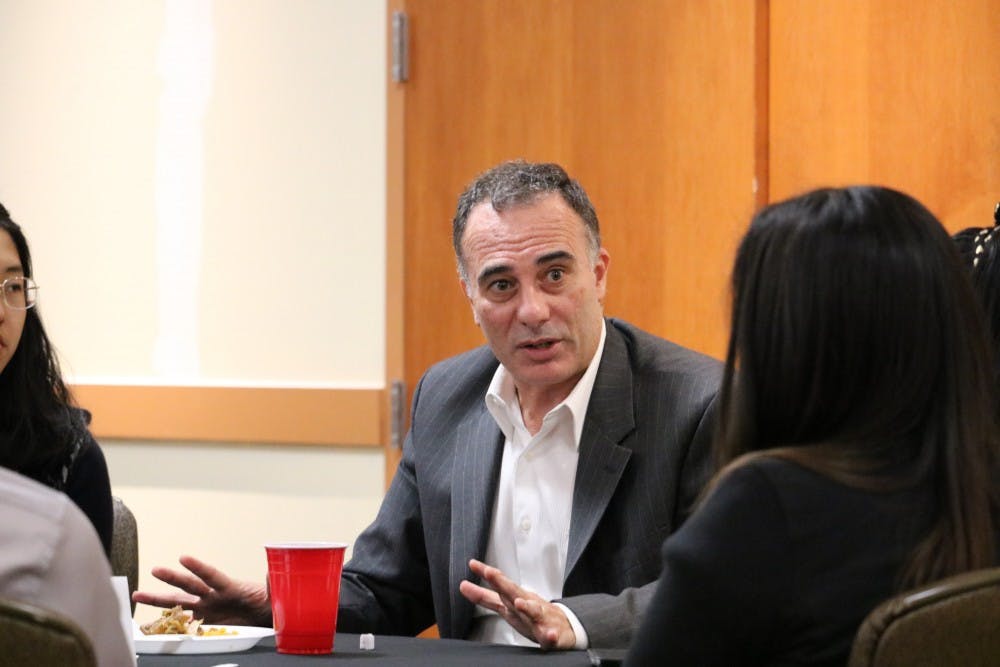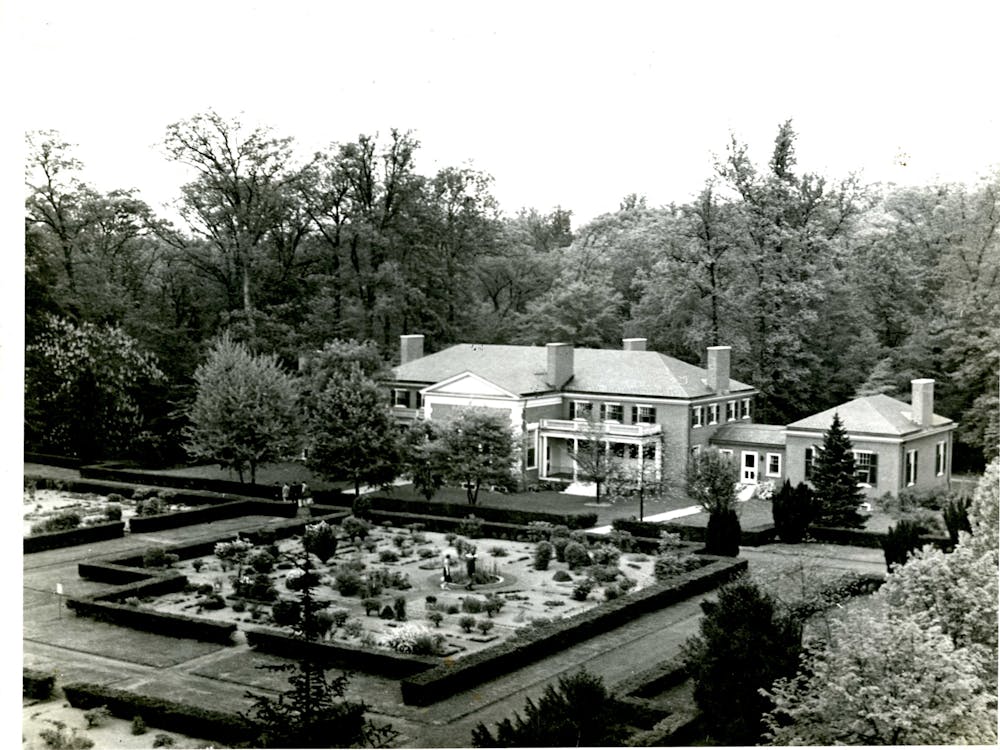Lambda Epsilon Mu (LEM), the Latino pre-health honor society at Hopkins, organized a Health Professionals Roundtable on Tuesday, Oct. 24. The event took place in Charles Commons and featured four health professionals from underrepresented backgrounds: Dr. Lisa DeCamp, Dr. David Benavides, Sarahi Juarez and Alexandre Medina.
The Roundtable was part of the Office of Multicultural Affairs (OMA)’s celebration of LatinX Heritage Month and aimed to give students a better insight into various career paths within the health field.
Sophomore Julia Bernal, the LEM Health Opportunities Chair, discussed why LEM decided to organize the Roundtable.
“We heard feedback from members that they just wanted an opportunity to speak to people who understood how being underrepresented in health professions feels,” she said.
The event was structured as an informal roundtable discussion. Each of the four guest speakers was seated at a different table, and students were divided into four groups and rotated among the tables.
Bernal addressed the way the event was structured.
“We didn’t want to just have a lecturer talking about their lives, we wanted to have a conversation flow,” she said. “We wanted it to be much more informal.”
Bernal talked about how LEM tried to represent different types of health professions and academic paths to give students a better idea of the opportunities available to them. The opportunities discussed during the event included medical school, PhD programs and public health professions.
Juarez is a program coordinator at Centro SOL, a Hopkins-affiliated organization that seeks to promote public health among Latinos. She has been in the role for a little over two months and was placed there through the Hopkins School of Medicine as part of the Baltimore Corps Fellowship.
Juarez discussed Centro SOL’s role in the Baltimore community.
“Our mission statement is to provide equity in healthcare and opportunities and education among Latino populations in Baltimore,” she said.
She talked about some of the programs that Centro SOL offers, encouraging Hopkins students to volunteer and get involved. For example, Testimonios is a mental health support program for adults and teenagers.
During most of Centro SOL’s programs for adults, they also offer free meals and childcare services. Testimonios also offers a mental health support group for teenagers, which caters to 10 Baltimore high schools and has a total of 95 participants.
“A lot of these teens also need mental health support, because a lot of them are fleeing domestic abuse, violence or some sort of trauma,” Juarez said. “We want to be able to help them in every single way.”
DeCamp is also a core faculty member of Centro SOL, as well as an assistant professor of general pediatrics and adolescent medicine at the Johns Hopkins Hospital. She practices general pediatrics at the Bayview Medical Center and is the director of the Bayview Latino Family Advisory Board.
DeCamp’s research is focused on improving both the access and quality of pediatric primary care, along with patient safety. She discussed the challenges associated with catering to the medical needs of the growing Latino population in Baltimore.
“There’s a lot of barriers to access health insurance, which means it’s hard for you to get healthcare,” DeCamp said. “There are several programs at Hopkins to help alleviate some of those barriers, but it’s not a comprehensive insurance system.”
Most children in these communities are second-generation immigrants, which makes them eligible for insurance like Medicaid. As a result, DeCamp observed that children and pregnant mothers are the primary demographics of the Latino population who seek treatment.
DeCamp concluded by talking about how she personally balances having a family and two kids with her career as a doctor and a researcher, emphasizing that it is important to plan and prioritize when starting a family.
Medina, who has a PhD, is an associate professor in the department of pediatrics at the University of Maryland School of Medicine. He completed his undergraduate and graduate education in Brazil and moved to the U.S. for postdoctoral research at Virginia Commonwealth University.
Through his research, Medina has explored how early alcohol exposure affects the neuroplasticity of specific areas of the brain. His current focus is on the effect of external factors on how the brain processes sensory information.
Medina encouraged students interested in health professions to consider academia as a career path.
“Doing medical school doesn’t mean that you can’t do science. I think it makes you a better doctor if you think like a scientist,” he said. “One of the most gratifying things in science is that every day is different, you have enormous flexibility.”
He added that while there are difficulties associated with research and academia, students should still try to get involved.
“You’re not in control of funding... and there are several things about academia that you may not like, but boredom is not one of them,” Medina said. “You have a lot of freedom, and you can reconcile practice and research.”
Benavides also works at the University of Maryland School of Medicine, where he is an assistant professor in the department of neurology. He directs a clinical neuroscience research program investigating the immune regulation of neuronal function.
Benavides, who has an M.D. PhD, received a research fellowship as an undergraduate, which fostered his interested in studying and working with the brain.
Though he did explore other fields, he urged students to pursue opportunities in areas that they are passionate about.
“I fell in love. It was hard for me to get away from neuroscience,” Benavides said. “[People] kept giving me opportunities and I kept trying to make the best of those opportunities.”
Even for students not interested in pursuing a PhD, Benavides discussed how students can involved in research through fellowships available during medical school.
Benavides advised students interested in pursuing careers in health fields to avoid planning their lives out entirely.
“Take risks and fail in glorious fashion. Don’t be scared, because that’s when growth happens. Seek out advice from others, and have fun,” he said.
After the event, junior Sabrina Mackey-Alfonso talked about the importance of having events like this at Hopkins to provide networking and resources that the Pre-Professional Advising Office lacks.
“The Pre-Professional Office has an [M.D. PhD] consultant on staff, but we aren’t allowed to email him and only get to have a formal meetings with him the year we are applying, which is much too late, which makes this opportunity so much more important,” Mackey-Alfonso said.
Sophomore Diego Luna enjoyed the roundtable’s speakers and its format.
“I wanted that one-to-one interaction with people in the field,” Luna said. “It’s just given me more positive reinforcement, that it’s okay to not know exactly what you want to do as long as you’re happy with what you’re doing and you’re not afraid to take risks then it’ll all be fine.”
Correction: Diego Luna was originally misidentified as Diego Cardona.
The News-Letter regrets this error.























Please note All comments are eligible for publication in The News-Letter.